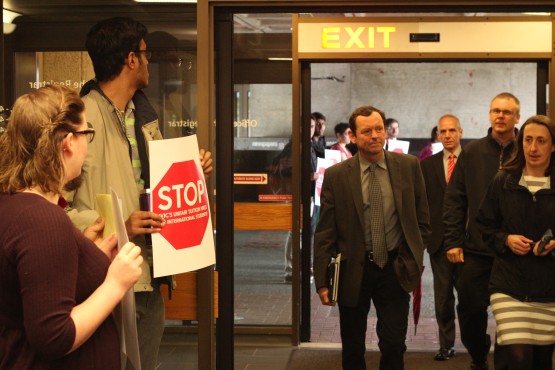UVSS International Student rep says 20% hike took him by surprise

UVic President Jamie Cassels heads into the Board of Governors meeting in 2017 as students demonstrate against international tuition fee spikes. In 2018, they could rise by up to 20 per cent. File photo by Myles Sauer
It’s happening again.
After raising international student tuition fees by four per cent last March, the University of Victoria administration is set to raise them by another 20 per cent for almost all incoming undergraduate international students.
The Board of Governors will vote on their 2018–2019 budget on March 27 in UVic’s Senate Chambers, and new international students will more than likely have to dig deeper in their pockets as a result.
If passed, the budget would see incoming international students pay 20 per cent more for the 2018–2019 academic year and then another 15 per cent more for the 2019–2020 year.
There are some exemptions to the change. International students entering the Bachelor’s of Commerce program at UVic would pay six per cent more this September. Most international graduate students would see their fees rise by four per cent, though entrants to the Master of Global Business and the Master of Business Administration programs would see their fees increase by 20 per cent and 14 per cent respectively.
Tuition for domestic undergraduate and graduate students would rise by two per cent, the maximum increase allowed under UVic policy.
Current students would see their fees raised only four per cent, as they are “grand-parented” and have their fees capped at that number.
Altogether, increases in international student fees would see the university bag $2.94 million dollars in revenue.
A spokesperson for the university told the Martlet that no financial matters are up for discussion by the university until the Board of Governors considers the budget.
The UVSS are planning to protest the international student fee hikes by ensuring a student presence at the Board of Governors meeting. There they will request that the administration vote “no” and cap fee increases to a more reasonable percentage, and they are asking for as many students to join them as possible. The meeting begins at 11 a.m.
Drafted by UVic’s Finance Committee, the proposed budget claims that the increase will match UVic’s tuition prices to other universities and “reflect the quality of [UVic’s] degree programs.”
“These increases will adjust our fees such that they will be comparable to SFU, Western and Carleton’s current 2017/18 fees,” the proposal reads.
The raises come as a blow to the UVSS, who have talked openly about a four per cent cap on tuition fee increases for international students as a board success. But Dheeraj Alamchandani, Director of International Student Relations with the UVSS, says the university did not communicate the full scope of the increase to him in discussions between the administration and the students’ society.
The UVSS and the university administration held consultations with international students in September 2017 regarding the issue of international tuition. At those consultations, Alamchandani says he got the impression the university were on board with capping tuition increases at four per cent. He didn’t realize the administration were planning on hiking fees for incoming students until he was told about the proposed budget on Sunday, March 18, a day before it was made public.
“It’s just like saying half a sentence, and you tell me one clause, and I just didn’t realize that there could be a second clause after that,” the Director of International Student Relations says. “I just felt there was like a disconnect in communication there.”
“If there need to be negotiations and needs to be discussion, instead of just telling us that it’s going to be 20 [per cent] I feel like a more respectful way would be saying that, ‘We are in trouble and let’s find a solution together,'” Alamchandani says, “rather than saying, ‘we were in trouble, we found a solution, and now somebody’s going to be paying the price who steps into this country as a student.'”
Currently, fees from international students constitute 33 per cent of the university’s tuition revenue, although only 17 per cent of the university population are international students.
“The proportion of tuition revenue from international students will likely increase each year as new tuition rates become applicable to a larger portion of the international student population as grand-parented students graduate,” reads the proposed budget.
Files by Angel Manguerra
**Correction: previous versions of this article misspelled Dheeraj Alamchandani’s name and claimed that consultations with international students took place in September 2018. Alamchandani’s name was correctly spelled, and these consultations occurred in September 2017.
This article has also been updated to clarify wording regarding what Alamchandani was surprised about and how he received news about the budget.
We sincerely regret the errors.








